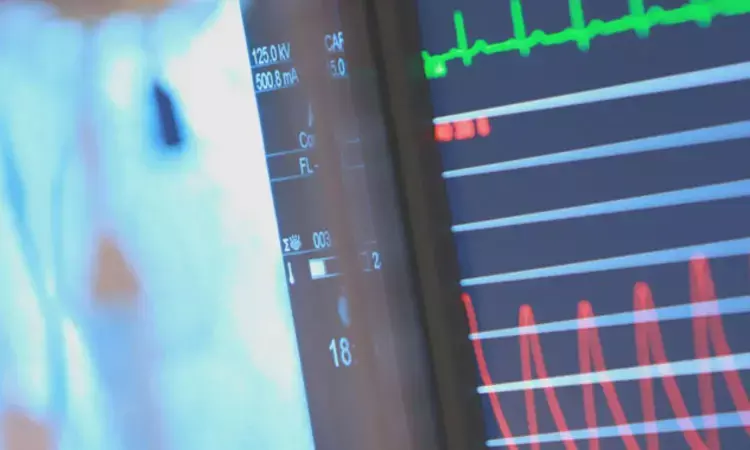- Home
- Medical news & Guidelines
- Anesthesiology
- Cardiology and CTVS
- Critical Care
- Dentistry
- Dermatology
- Diabetes and Endocrinology
- ENT
- Gastroenterology
- Medicine
- Nephrology
- Neurology
- Obstretics-Gynaecology
- Oncology
- Ophthalmology
- Orthopaedics
- Pediatrics-Neonatology
- Psychiatry
- Pulmonology
- Radiology
- Surgery
- Urology
- Laboratory Medicine
- Diet
- Nursing
- Paramedical
- Physiotherapy
- Health news
- Fact Check
- Bone Health Fact Check
- Brain Health Fact Check
- Cancer Related Fact Check
- Child Care Fact Check
- Dental and oral health fact check
- Diabetes and metabolic health fact check
- Diet and Nutrition Fact Check
- Eye and ENT Care Fact Check
- Fitness fact check
- Gut health fact check
- Heart health fact check
- Kidney health fact check
- Medical education fact check
- Men's health fact check
- Respiratory fact check
- Skin and hair care fact check
- Vaccine and Immunization fact check
- Women's health fact check
- AYUSH
- State News
- Andaman and Nicobar Islands
- Andhra Pradesh
- Arunachal Pradesh
- Assam
- Bihar
- Chandigarh
- Chattisgarh
- Dadra and Nagar Haveli
- Daman and Diu
- Delhi
- Goa
- Gujarat
- Haryana
- Himachal Pradesh
- Jammu & Kashmir
- Jharkhand
- Karnataka
- Kerala
- Ladakh
- Lakshadweep
- Madhya Pradesh
- Maharashtra
- Manipur
- Meghalaya
- Mizoram
- Nagaland
- Odisha
- Puducherry
- Punjab
- Rajasthan
- Sikkim
- Tamil Nadu
- Telangana
- Tripura
- Uttar Pradesh
- Uttrakhand
- West Bengal
- Medical Education
- Industry
Intracoronary brachytherapy, a safe, feasible option for drug-eluting stent restenosis

USA: Intracoronary brachytherapy (ICBT) for patients with in-stent restenosis (ISR) of a drug-eluting stent (DES) is a safe and effective treatment option. However, with the number of stent layers, there is a decrease in its effectiveness, says a recent study. The findings were published in the Journal of the Society for Cardiovascular Angiography & Interventions on 2 January 2023.
Many existing studies of intracoronary brachytherapy include mostly bare metal stent (BMS) in-stent restenosis or single drug-eluting stent ISR, or they need to report the number of stent layers. Data is required for this population because DES is now the predominant strategy for treating stable and unstable coronary lesions. Considering this, Stephen Ellis from Heart, Vascular, and Thoracic Institute in Cleveland Clinic, Cleveland, Ohio, and colleagues aimed to report outcomes of intracoronary brachytherapy in treating drug-eluting stent in-stent restenosis and identify correlated factors.
For this purpose, the researchers included patients who underwent ICBT for DES ISR from 2010 to 2021 in the single-institution retrospective PCI registry. Patients were treated with laser atherectomy, balloon angioplasty, and rotational atherectomy followed by ICBT at a dose of 18.4-25 Gy delivered at the ISR site with a dose estimated by the reference vessel size.
A 3-year target lesion failure rate was determined (primary outcomes). Secondary endpoints included 1-year r target lesion failure rate (TLF), all-cause mortality, target lesion revascularization (TLR), and cardiac mortality.
The study revealed the following findings:
- In total, 330 consecutive patients presented with 345 treated lesions; 70% were male, their age was 66 ± 11 years, 62% underwent previous bypass surgery, 55% were diabetic patients, and 89% were placed with at least two stent layers at the treated site.
- The rate of TLF was 18% at one year and 46% at three years.
- All-cause and cardiac mortality rates were 19.8% and 12.3% at three years.
- The number of stent layers was associated with 3-year TLF (1 layer, 33.3%; 2 layers, 47.0%, > three layers, 60.2%).
- Diabetes, repeat ICBT, final percent stenosis, lesion length, and intravascular imaging use were not correlated with the primary outcome.
- Lower ICBT dose and restenosis <1 year from the previous percutaneous coronary intervention were correlated with early (1-year) TLF.
To conclude, intracoronary brachytherapy for recurrent DES ISR provided a low recurrence rate at one year, substantially increasing by three years. Outcomes most closely corresponded with stent layers, but lower ICBT dose and early restenosis adversely impacted early TLF.
"Future work should include prospective double-blinded randomized control studies comparing intracoronary brachytherapy with a drug-coated balloon in multilayer in-stent restenosis, which holds promise in this population," the researchers wrote, testing of combination therapies, and evaluating the utility of higher dose or repeat brachytherapy dosing at set time intervals on outcomes in ISR treated with brachytherapy."
Reference:
Ho, E., Denby, K., Cherian, S., Ciezki, J., Kolar, M., Wilkinson, D., Wagener, J., Young, L., Essa, A., & Ellis, S. (2023). Intracoronary Brachytherapy for Drug-Eluting Stent Restenosis: Outcomes and Clinical Correlates. Journal of the Society for Cardiovascular Angiography & Interventions, 100550. https://doi.org/10.1016/j.jscai.2022.100550
Dr Kamal Kant Kohli-MBBS, DTCD- a chest specialist with more than 30 years of practice and a flair for writing clinical articles, Dr Kamal Kant Kohli joined Medical Dialogues as a Chief Editor of Medical News. Besides writing articles, as an editor, he proofreads and verifies all the medical content published on Medical Dialogues including those coming from journals, studies,medical conferences,guidelines etc. Email: drkohli@medicaldialogues.in. Contact no. 011-43720751


